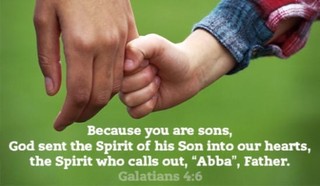
- Recent Translations
- All Translations
Galatians 4:26
Share
Settings
Images for Galatians 4:26

Galatians 4:26 Meaning and Commentary
But Jerusalem which is above
This Sarah was a type and figure of; she answered to, and agreed with this; which is to be understood, not of the church triumphant in heaven, but of the Gospel church state under the administration of the new covenant; and that, not as in the latter day glory, when the new Jerusalem shall descend from God out of heaven, but as it then was in the apostle's time, and has been since. Particular respect may be had to the first Gospel church at Jerusalem, which consisted of persons born from above, was blessed with a Gospel spirit, which is a spirit of liberty, out of which the Gospel went into all the world, and from among whom the apostles and first preachers of the word went forth everywhere, and were the means of the conversion of multitudes, both among Jews and Gentiles, and so might be truly said to be the mother of us all. The church in general, under the Gospel, may be, as it often is, called Jerusalem, because of its name, the vision of peace; being under the government of the Prince of peace; the members of it are sons of peace, who are called to peace, and enjoy it; the Gospel is the Gospel of peace, and the ordinances of it are paths of peace; and the new covenant, under the administration of which the saints are, is a covenant of peace. Jerusalem was the object of God's choice, the palace of the great King, the place of divine worship, was compact together, and well fortified: the Gospel church state consists of persons, who, in general, are the elect of God, among whom the Lord dwells, as in his temple. Here his worship is observed, his word is preached, and his ordinances administered; saints laid on the foundation, Christ, and being fitly framed together, grow up unto an holy temple in him, and are surrounded by him, as Jerusalem was with mountains, and are kept by his power unto salvation. This is said to be above, to distinguish it from the earthly Jerusalem, the inhabitants of which were chiefly men of the world, carnal men; but this heavenly Jerusalem, or Gospel church state, chiefly consists of persons born from above, called with an heavenly calling, and who bear the image of the heavenly one, whose conversation is in heaven, who are seeking things above, and in a little time will be there themselves; its constitution and form of government are from above, and so are its doctrines, and its ordinances. The Jews often Speak of (alyeld Mlvwry) , or (hale) , or (hlem lv) , "Jerusalem above" F24, as distinguished from Jerusalem below: and to this distinction the apostle seems to have respect here, who further says concerning this Jerusalem, that she
is free;
from the servitude of sin, Satan, and the world, from the yoke of the law, and from a spirit of bondage; having the Spirit of God, the spirit of adoption, who is a free spirit, and makes such free that enjoy him; and where he is, there is true liberty. He adds,
which is the mother of us all;
that are born again, whether Jews or Gentiles, as particularly the church at Jerusalem was, and the Gospel church state in general may be said to be; since here souls are born and brought forth to Christ, are nursed up at her side, and nourished with her breasts of consolation, the word and ordinances. This form of speech is also Jewish: thus it is said F25 that
``Zion, (larvyd Nma) , "the mother of Israel", shall bring forth her sons, and Jerusalem shall receive the children of the captivity.''Again, explaining ( Proverbs 28:24 ) it is observed F26, that there is no father but the ever blessed God, (wma Nyaw) , "and no mother" but the congregation of Israel. Some copies leave out the word "all"; and so do the Vulgate Latin, Syriac, and Ethiopic versions, and only read, "the mother of us", or "our mother".
F24 Zohar in Gen. fol. 13. 2. & 16. 2. & 75. 4. & 77. 1. & 78. 2. & 114. 3. & 121. 1. & in Exod. fol. 6. 1. & 92. 2. T. Bab. Taanith, fol. 5. 1. Gloss. in T. Bab. Sanhedrin, fol. 97. 2. Caphtor, fol. 14. 2. & 25. 2. & 65. 1. & 68. 2. & 71. 2. & 118. 2. Raziel, fol. 13. 1. & 27. 1. Tzeror Hammor, fol. 61. 3. & 150. 3. Nishmat Chayim, fol. 26. 2. Kimchi in Hos. xi. 19.
F25 Targum in Cant. 8. 5.
F26 Sithre Tora in Zohar in Gen. fol. 55. 2. & Raya Mehimna in Zohar in Lev. fol. 34. 1.